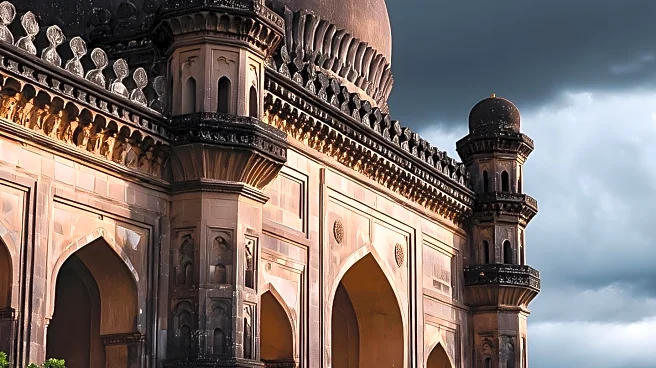What is the story about?
What's Happening?
William Dalrymple, a renowned historian and broadcaster, shares his experiences and insights in a recent interview. He discusses his fascination with historical figures like Mahendravarman, a seventh-century Pallava king known for his contributions to art and temple architecture. Dalrymple recounts memorable encounters, including being shot at in various conflict zones and meeting celebrities like Mick Jagger. He reflects on his travels, particularly a journey from Jerusalem to Mongolia, highlighting the cultural and historical changes he has witnessed over the years. Dalrymple also expresses a desire to learn more about the ancient Buddhist monastery of Nalanda, emphasizing its historical significance.
Why It's Important?
Dalrymple's reflections offer a unique perspective on historical and cultural preservation. His experiences underscore the fragility of cultural heritage and the impact of geopolitical changes on historical sites. By sharing his insights, Dalrymple contributes to a broader understanding of global history and the importance of preserving cultural landmarks. His stories also highlight the interconnectedness of global cultures and the role of historians in documenting and interpreting these connections. Dalrymple's work serves as a reminder of the value of historical research and the need to protect cultural heritage from modern threats.
What's Next?
Dalrymple's ongoing work and public engagements continue to inspire interest in historical research and cultural preservation. His reflections may encourage further exploration and excavation of sites like Nalanda, potentially uncovering new historical insights. As geopolitical dynamics evolve, historians like Dalrymple play a crucial role in advocating for the protection of cultural heritage. His experiences may also influence future historians and researchers to prioritize the documentation and preservation of vulnerable historical sites.
Beyond the Headlines
Dalrymple's interview touches on deeper themes of cultural identity and historical memory. His experiences in conflict zones and interactions with diverse cultures highlight the ethical considerations of historical research and the importance of cross-cultural understanding. The interview also raises questions about the role of historians in shaping public perceptions of history and the ethical responsibilities associated with documenting and interpreting historical events.
















